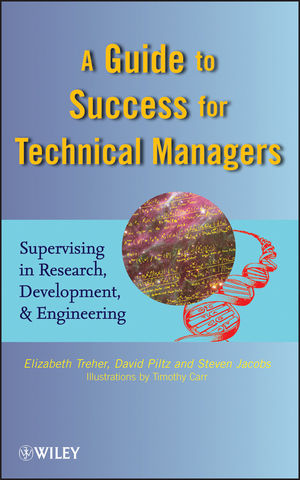A Guide to Success for Technical Managers: Supervising in Research, Development, and EngineeringISBN: 978-0-470-43776-6
Hardcover
320 pages
December 2010
 This is a Print-on-Demand title. It will be printed specifically to fill your order. Please allow an additional 10-15 days delivery time. The book is not returnable.
|
||||||
PREFACE xi
CHAPTER 1 TIPS ON TRANSITIONS FOR TECHNICAL MANAGERS 1
Transition Situations 1
Manager or Scientist? An Attribute Inventory 6
Manager–Scientist Inventory Score Sheet 10
Interpretation 12
Questions to Ask Yourself 12
Transition Situations—Solutions 13
References 14
Bibliography 14
CHAPTER 2 ADVICE ON CREATING A MOTIVATING CLIMATE 17
Motivation Situation 17
What Motivates You? 18
Why Is Motivation Important? 21
Diagnosing Motivation 22
Applying Theories about Motivation 22
Motivation Situation—Solution 28
References 29
Bibliography 29
CHAPTER 3 HINTS TO INCREASE INTERPERSONAL EFFECTIVENESS 31
Interpersonal Effectiveness—My Story 31
The Myers–Briggs Type Indicator 32
Using Type Effectively 34
Applying Characteristics of Type 39
Role of Emotions and Trust 43
References 46
Bibliography 46
CHAPTER 4 CLUES ABOUT COMMUNICATION PITFALLS AND STRATEGIES 49
Communication Situation 49
Communication Patterns and Factors 50
The AIDR Technique 55
Focusing on Others—A Development Experiment 56
Ask Questions 57
Challenge Assumptions 58
Email 58
Email Guide 59
Applying the MBTI 60
Planning a Personal Communication Strategy 63
Communication Situation—Suggestions 64
References 64
Bibliography 65
CHAPTER 5 SECRETS TO MANAGING PERFORMANCE 67
Performance Situation 67
Setting Expectations and Goals 68
Consider Personal Styles—Both Yours and Your Employee’s 71
Managing Performance 74
Performance Problem Solving 76
Dealing with Performance Issues 76
Managing a Performance Issue 77
Distinguishing between Observations and Conclusions 78
Performance Conversation Checklist 80
Tackling Recurring Problems 81
Performance Issue Linked to Technical Problems 81
Managing Managers 83
Suggested Answers for Distinguishing between Observations and Conclusions 86
References 87
Bibliography 87
CHAPTER 6 INCREASING EFFECTIVENESS THROUGH DELEGATION 89
Delegation Situation 89
Delegation Choices 90
Delegation Benefits 91
Delegation Analysis 93
Delegation Profile 95
Planning for Delegation 96
Styles of Delegation 97
Relation of U/E to Delegation Style 101
Delegation Checklist 102
Delegation Using Type 104
Temperaments 107
Applying New Concepts and Skills 108
Delegation Situation—Solution 109
Delegation Choices—Suggestions 109
References 110
Bibliography 110
CHAPTER 7 POINTS FOR SUCCEEDING AS A COACH 113
Coaching Success 113
Building Connections 114
How Do Star Performers Network? 115
Group Social Networks 115
Challenging the Status Quo 117
Looking Forward 121
Suggestions for Development Activities 122
Coaching Success—Solution 131
References 132
Bibliography 132
CHAPTER 8 TECHNIQUES TO MANAGE GROUPS, TEAMS, AND MEETINGS 135
Facilitation Situation 135
Building Collaboration 136
Role Clarification Activity 137
Goal Clarification Activity 138
Group Operating Principles or Norms 138
Increasing Meeting Effectiveness 139
Individual Autonomy versus Group Interdependence 140
Decision Making 142
Meeting Management Techniques 143
Application: Your Own Meeting 147
Facilitation Situation—Suggestions 149
References 150
Bibliography 151
CHAPTER 9 CLUES TO FOSTER CREATIVITY AND INNOVATION 153
Sam’s Dilemma 153
Social and Educational Input on Creativity 154
Raising the Bar for Creativity and Innovation 155
Definitions: Creativity and Innovation 156
Sam’s Dilemma—Resolved 166
References 167
Bibliography 168
CHAPTER 10 POINTERS ON MANAGING PROJECTS AND DECISIONS 171
Project Support 171
So, What Can You Do? 173
Learn the Basics of Project Management 173
Understand and Take Advantage of Different Approaches to Project Planning 173
Challenge What Does Not Make Sense 175
Consider the Difference between Risk and Uncertainty 175
Look for Ways to Improve Communication in Your Project 176
Avoid Going for the Big Bang—Prioritize and Proceed Incrementally 177
Be Assertive and Work to Kill a Project That Should Die 180
Use Consensus Wisely and Make Timely Decisions 181
Project Support—Suggestions 186
References 187
Bibliography 188
CHAPTER 11 SUGGESTIONS FOR MANAGING UP 191
Managing Up Stories 191
Build Your Relationship 193
Manage Communication 194
Guidelines to Approach Your Boss 197
Guidelines for Receiving Feedback 198
Managing Up Stories—Resolved 201
References 203
Bibliography 204
CHAPTER 12 LET’S USE IT RIGHT: A SUMMARY OF SUGGESTED APPROACHES 205
References 215
FIFTY-TWO-WEEK LEADERSHIP JOURNAL 217
INDEX 315



